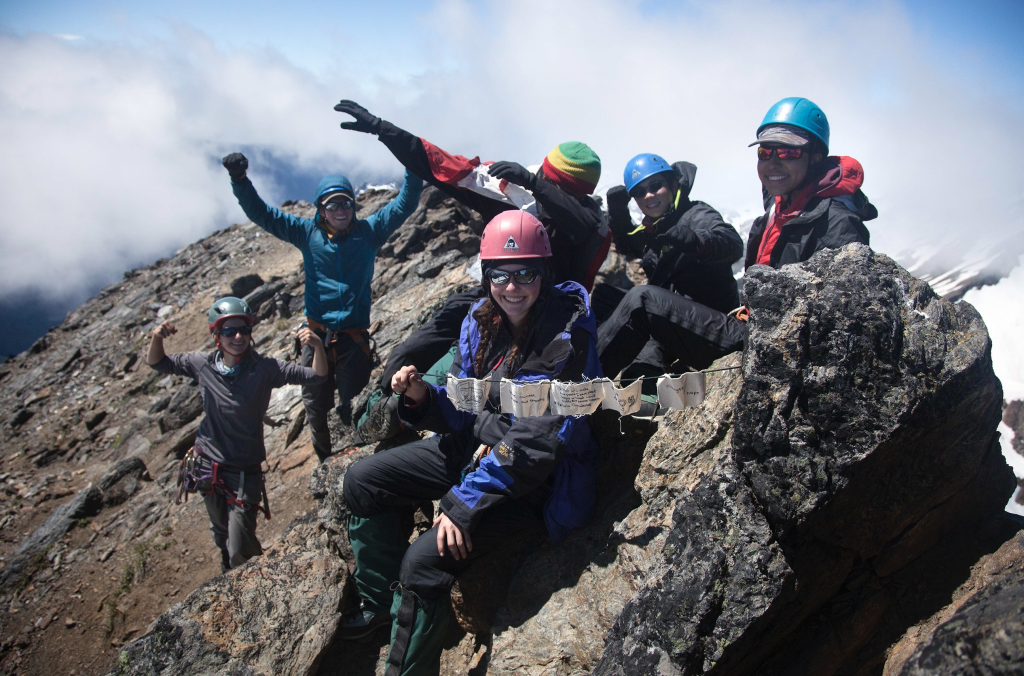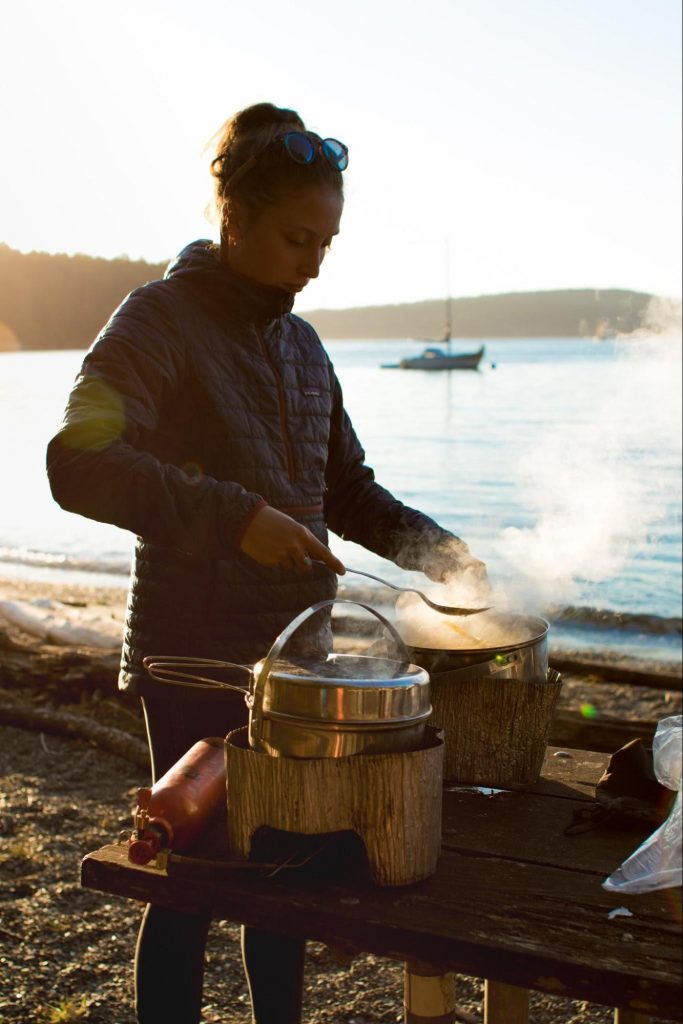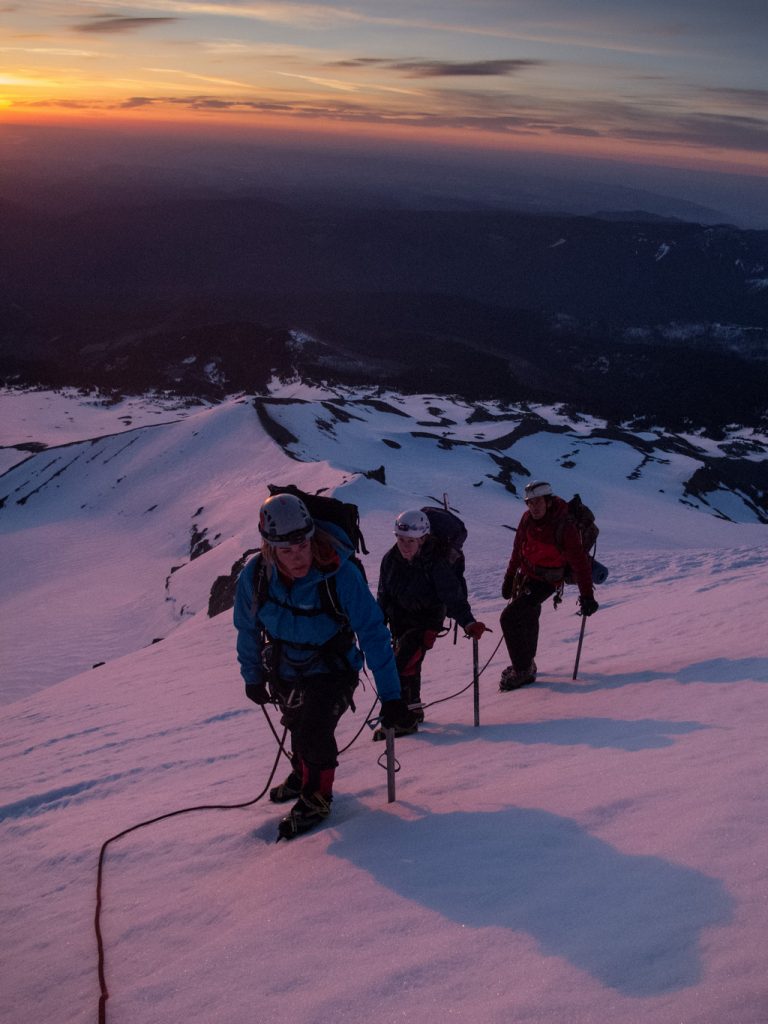It was day 18 of a 21-day course in the Oregon Cascades, and our crew was eating macaroni and cheese in the shadow of Mt. Thielsen. We had navigated class III rapids and hiked over 60 miles on the Pacific Crest Trail. We spent the day hiking off-trail over a steep mountain pass in the heat of the sun. Everyone was exhausted, including the Instructors. And the next day? We were planning on a peak attempt.
On day 19 we had another pre-dawn wakeup, and our crew of seven teenagers and two Instructors functioned like a well-oiled machine. We all did what we needed to do to have a successful day. Everyone carried the gear required to reach the summit of Mt. Thielsen, and we were right on schedule when we took an extended lunch break beneath the final section of technical climbing. Students took turns helping each other get through the hard parts of the approach hike and finding the best route to the top. A little bit later, we were standing on the summit high-fiving and taking in the views. In my experience, I know that not every crew reaches the summit, but if the group takes responsibility and dedicates itself to the entire process of challenge, self-discovery and vulnerability, resilience is slowly crafted and the group is capable of anything.

If the group takes responsibility and dedicates itself to challenge, self-discovery and vulnerability, the group is capable of anything.
Designed by Challenge
Outward Bound courses are designed by challenge. Pushing boundaries and finding an individual’s physical and mental threshold is the very essence of a course. In the moment, it usually seems like one of the hardest things a student has been asked to do: days or weeks of being vulnerable, stepping outside of one’s comfort zone, and accepting the day’s challenge is a pretty big request. However, doing this over the course of days and weeks leads up to perhaps the greatest learning of participating in Outward Bound…resilience.
It takes a high level of strength and fortitude to wake up early every day in a unique physical and social setting and to try new things. For students, this could mean anything from rock climbing for the first time or paddling a canoe. In the backcountry, there are certain things that students need to do to have a safe and successful course. Sure, some things are optional, but many less glamorous, day-to-day tasks have to be completed by the end of the day. The things that are normally easy back home become a new challenge. Finding a good place to sleep, preparing food and cleaning up after meals are no longer simple tasks. Of course, it’s a challenge and learning experience for every student to complete these tasks each day while striving for excellence.

A student cooks pasta by the sea after a rewarding day of kayaking.
Responsibility Is Key
Responsibility is a major learning objective across every Outward Bound program. As an Instructor, I take great joy and pride in watching young people realize that their peers are depending on each other for basic needs like food, water and shelter. Rising to the call to help one another with these things is usually a pivotal moment. The tasks mentioned above are the ones that the group doesn’t have a choice in whether or not they do. Learning this level of responsibility is crucial for the group to grow and reach its peak function. Lending a hand, embracing the mundane and getting the job done in a professional and timely manner are all important lessons to use back home. Over time, as they learn how to live in a new setting and accept responsibility, the crew starts to thrive and adversity is easily handled.
With the current pandemic, each day is a new challenge. However, there are still things that need to get done. I’ve heard from friends and family that a lack of motivation and feelings of boredom have begun to permeate each day. We’re no longer able to leave the house and do the things that inspire us. At home, the mundane tasks have become a little bit more mundane. During these times, it’s natural to feel frustrated, upset and tired. There are days when the usual things that cheer me up don’t give me the same level of joy. When these feelings begin to creep into a course, I usually hit pause and ask everyone, “What are the things that we do have control over?” We can’t control the weather, the length of the trail or the shape of the river. The only thing that we really have control over is how we handle these factors. We could close our eyes and be upset with the weather, complain about a long day of hiking and refuse to go down the river. But aside from being unrealistic, that wouldn’t help us in any way. So instead we put on a jacket to embrace the rain, eat a snack to power through the last few miles and ask for help to reach the bottom of the rapid. In my mind, this is the essence of resilience. We learn this by taking control over the few things that we can, and working our hardest to do a great job all while knowing that completing the task is a necessary endeavor. This is the same approach that we ought to take with the pandemic. I can’t control the line at the grocery store, but I can try my best to cook the best possible dinner with the ingredients in my pantry.

Responsibility is a major learning objective across every Outward Bound program.
I don’t doubt that once completing a course, students have increased resilience to deal with challenges back home, like those brought on by the pandemic. By learning the true meaning of responsibility, the Outward Bound community has learned to thrive through challenge and, as I like to say, “lean into” the problems that used to push us in the wrong direction. Although we can be certain that returning to a “new normal” will be difficult and take a long time, we can also be certain that everything will be okay and we will return eventually. Life might be different and there will be hardships and bumps in the road, but accepting this while doing our best to control how we handle these hardships will truly define us as a society. Our resilience is being tested. And I know we’ll pass the test.
About the Author
Nick McEachern is an Outward Bound Instructor who splits his time between Central Oregon and Salt Lake City. His passion is looking at the edges of the map for adventurous ways to travel across landscapes and waterways with his friends. He enjoys drinking coffee in his sleeping bag and paddling into a headwind.
OTHER POSTS YOU MAY LIKE
Read More
Read More
Read More




